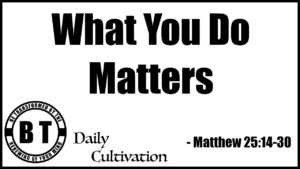
In Matthew 25:14-30 Jesus teaches the parable of the bags of gold. He tells this story because it is a true depiction of what the kingdom of heaven is like.
As the story goes a master gathers his three servants and entrusts his wealth to them, each according to their ability, and then goes on a long journey. What is important to note is that what the master entrusts, he also requires increase.
Two of the three servants go straight away and put the money to work. Each of them doubles what they were given. The third servant with the least amount of money goes and buries his bag of gold in the ground.
After a long time the master returns and he gathers his servants to settle accounts with them. The man who had received five bags of gold brought the other five. “Master” he said, “you entrusted me with five bags of gold. See, I have gained five more.”
The master replied, “well done, good and faithful servant! You have been faithful with a few things; I will put you in charge of many things. Come and share your master’s happiness!”
The man with two bags of gold also came. “Master,” he said, “you entrusted me with two bags of gold, see, I have gained two more.”
His master replied, “Well done, good and faithful servant! You have been faithful with a few things; I will put you in charge of many things. Come and share your master’s happiness!”
These first two servants did what was expected of them. They were given responsibility in keeping with their ability and they doubled what they were given. They were expected and required to bring increase. They were faithful in their work and therefore rewarded for it. They entered their masters happiness and were given even more responsibility. Their master was pleased because of their faithfulness. They were given greater responsibility because they proved they were capable.
Responsibility requires your potential and causes you to become better and more skillful. As you continue to grow in ability, you are able to take on more responsibility.
This parable proves that we have been given duties and responsibilities that we will be held accountable for. The master was gone for a long time, like a real long time. But when he did come back the accounts were settled right away.
This is why James 2:20 “ You foolish person, do you want evidence that faith without deeds is useless?”
And in James 2:24, “You see that a person is considered righteous by what they do and not by faith alone.”
What he means is that faith is proved through action, not just by words. What we do reflects what we actually believe.
To be continued…….
